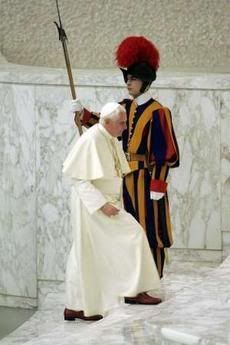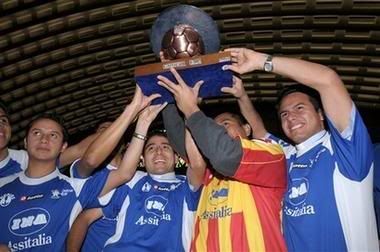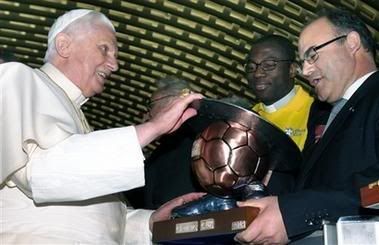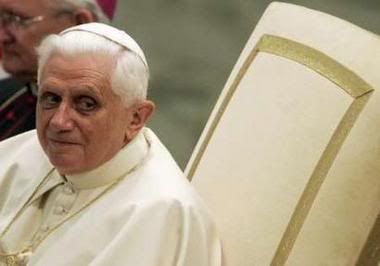The Pope at At Today's Wedensday Audience-
The Holy Father again has a wonderful Wednesday Audience that focuses on the Church Fathers. This week he talks about one that I was not aware of very well. There is a lot here. When I read this I think of our own times. One of the most important books I ever read was St Augustine's City of God. I liked it for various reason. One was it showed St Augustine's humor.
However what strikes you was the time it was written in. Basically things were going to hell in a handbasket. When Rome fell to the barbarains it was like Sept 11 times 1000 to the average person. It does give one perpective. This Church Father lived during that era where it appeared everything was falling apart. Both on a Christian level and as to secular society. I also like the fact that the Holy Fathers talks about how those invasions really had an effect on what is available to us today as to these writings. How much was lost during those dark days? How many manuscripts were burned or destroyed? How much early Christian heritage went up in a puff of smoke? Who knows. I suspect a lot. Anyway a very good Wednesday talk by the Pope as usual. Thanks again to the Ratzinger Forum for the pics and translation
AUDIENCE OF 12/5/07
AUDIENCE OF 12/5/07
Here is a translation of the Holy Father's catechesis at the General Audience held today in the Aula Paolo VI.
Dear brothers and sisters!
In the last catecheses, we made an excursion to the Semitic-speaking Churches of the East, meditating on the Persian Aphraates and the Syrian St. Ephrem. Today, we return to the Latin world, in the North of the Roman Empire, with St. Chromatius of Aquileia. This bishop carried out his ministry in the ancient Church of Aquileia, fervent center of Christian life in the tenth region of the Roman Empire, which was composed of Venetia and Histria.
In 368, when Chromatius ascended the episcopal seat of the city, the local Christian community had already matured with a glorious history of loyalty to the Gospel. Between the middle of the third century and the beginning of the fourth, the persecutions of Decius, Valerian and Diocletian had reaped a great number of martyrs. Moreover, the Church of Aquileia was threatened like many other churches at the time by the Arian heresy. Athanasius himself - standard bezarer of the Nicene Creed, whom the Arians had chased into exile - found refuge in Aquileia for a time.
Under the leadership of its bishops, the Christian community resisted the snares of heresy, reinforcing its adherence to the Catholic faith. In September 381, Aquileia was the site of a Synod which convened 35 bishops from the African coast, the valley of the Rhone, and all of the empire's tenth region. The Synod was called to vanquish the last traces of Arianism in the West. Taking part in the Synod was the priest Chromatius, as an expert for the Bishop of Aquileia, Valerian (370/1-387/8).

The years around the Syond of 381 constituted the 'golden age' of the Aquileian community. St. Jerome, who was a native of Dalmatia, and Rufinus of Concord, spoke with nostalgia about their stay in Aquileia (370-373), in that sort of theoligical cenacle which Jerome did not hesitate to define as tanquam chorus beatorum - like a choir of blessed ones' (Cronaca: PL XXVII,697-698). This cenacle - which recalled in certain aspects the communal experiments carried out by Eusebius of Vercelli and by Augustine - formed the most noteworthy personages of the Churches of the Upper Adriatic region.

The years around the Syond of 381 constituted the 'golden age' of the Aquileian community. St. Jerome, who was a native of Dalmatia, and Rufinus of Concord, spoke with nostalgia about their stay in Aquileia (370-373), in that sort of theoligical cenacle which Jerome did not hesitate to define as tanquam chorus beatorum - like a choir of blessed ones' (Cronaca: PL XXVII,697-698). This cenacle - which recalled in certain aspects the communal experiments carried out by Eusebius of Vercelli and by Augustine - formed the most noteworthy personages of the Churches of the Upper Adriatic region.
Already within his family, Chromatius had learned to know and love Christ. St. Jerome himself spoke about this with great admiration, likening Chromatius's mother to the prophetess Anna, his two sisters to the prudent virgins of the Gospel parable, Chromatius himself and his brother Eusebius to the young Samuel (cfr Ep VII: PL XXII,341). Of Chromatius and Eusebius, Jerome further wrote: "The blessed Chromatius and St. Eusebius were brothers by blood but not less in the identity of their ideals" ((Ep. VIII: PL XXII,342).
Chromatius was born in Aquileia around 345. He was ordained deacon and later priest, finally being elected Pastor of that Church, around 388. After receiving his episcopal ordination from Bishop Ambrose, he dedicated himself with courage and energy to a task that was enormous for the sheer vastness of the terriotry entrusted to his ministry: the ecclesiastical jurisdiction of Aqwuileia extended from northern Italy to the territories of present-day Switzerland, Bavaria, Austria and Slovenia, up to the borders of Hungary.
One can deduce how well-known and respected Chromatius was in the Churches of his time from an episode in the life of St. John Chyrsostom. When the Bishop of Constantinople was exiled from his seat, he wrote three letters to those he considered the most important Bishops of the West, to ask them to get him support from the emperors - he wrote one to the Bishop of Rome, the second to the Bishop of Milan, and the third to the Bishop of Aquileia, Chromatius.
But even for Chromatius, those were difficult times because of the precarious political situation. Most probably, he died in exile, in Grado, while he was trying to flee from barbarian incursions in 407, the same year when the Chrysostom also died. In prestige and importance, Aquileia was the fourth in the Italian peninsula, and the ninth in the Roman empire - which made it a target for the Goths and the Huns. Besides causing grave wars and destruction, the barbarian invasions seriously compromised the transmission of the works of the Fathers preserved in the episcopal library which had a wealth of codices.
And so, even the writings of St. Chromatius were dispersed here and there, often ending up being attributed to other authors such as John Chrysostom (mostly because both names started with 'Chr'), or Augustine or Ambrose, or even Jerome himself, whom Chromatius had helped a lot in the textual review and Latin translation of the Bible. The rediscovery of a great part of Chromatius's work is owed to happy and fortunate circumstances that in recent years has allowed a reconstruction of a body of writing that is quite consistent: more than 40 sermons, about 10 of which are fragmentary, and more than 60 treatises of commentary on the Gospel of Matthew. Chromatius was a wise teacher and zealous pastor. His first and primary task was to listen to the Word in order to be able to annouce it himself.

Priests and seminarians participating in the Clericus Cop soccer tournament show off the Cup to the Pope. The second season has just started for the league made up of teams from 16 Pontifical institutions in Rome.

Priests and seminarians participating in the Clericus Cop soccer tournament show off the Cup to the Pope. The second season has just started for the league made up of teams from 16 Pontifical institutions in Rome.
In his teachings, he always started with the Word of God and led back up to it. Some themes were particularly dear to him: above all, the mystery of the Trinity, reflecting on it, as it is revealed throughout the history of salvation. Then, the subject of the Holy Spirit: Chromatius constantly called the attention of the faithful to the presence and action int he life of the Church of the Third Person in the Most Holy Trinity. But Chromatius was particularly persistent on the mystery of Christ: The Word incarnate as true God and true man, who assumed complete humanity to make a gift of his own divinity.
These truths, which he insistently reaffirmed even for anti-Arian purposes, would come to be formalized 50 years later in the Council of Chalcedon. His strong emphasis on the human nature of Christ led Chromatius to speak often of the Virgin Mary: his Mariologic doctrine was terse and precise. To him we owe some evocative descriptions of the Most Holy Virgin: Mary is the "evangelical virgin who was capable of sheltering God"; she is the 'immaculate and inviolate lamb' who gave birth to 'the lamb draped in red' (cfr Sermo XXIII,3: Scrittori dell’area santambrosiana 3/1, p. 134). The Bishop of Aquileia often spoke of the Virgin in relation to the Church: both, in fact, are 'virgins' and 'mothers'.

But his ecclesiology was developed above all in his commentaries on the Gospel of Matthew. Here are some of his recurrent concepts: the church is unique; it was born from the blood of Christ; it is a precious garment woven by the Holy Spirit; the Church is the place which proclaims that Christ was born of the Virgin and where brotherhood and concord flourish. An image that Chromatius was particularly fond of was that of a ship at sea in a storm - he lived in tempetuous times, as we heard earlier: "There is no doubt," the holy Bishop said, "that this ship represents the Church." (cfr Tract. XLII,5: Scrittori dell’area santambrosiana 3/2, p. 260). As the zealous pastor that he was, Chromatius knew how to speak to his people in a language that was fresh, colorful and incisive.

But his ecclesiology was developed above all in his commentaries on the Gospel of Matthew. Here are some of his recurrent concepts: the church is unique; it was born from the blood of Christ; it is a precious garment woven by the Holy Spirit; the Church is the place which proclaims that Christ was born of the Virgin and where brotherhood and concord flourish. An image that Chromatius was particularly fond of was that of a ship at sea in a storm - he lived in tempetuous times, as we heard earlier: "There is no doubt," the holy Bishop said, "that this ship represents the Church." (cfr Tract. XLII,5: Scrittori dell’area santambrosiana 3/2, p. 260). As the zealous pastor that he was, Chromatius knew how to speak to his people in a language that was fresh, colorful and incisive.
Although he knew Latin perfectly, he prefered to use popular language which was rich in easily understandable images. Thus, for example, using the sea as a metaphor, he contrasts, on the one hand, the act of fishing in which fish, once out of the water, die; and on the other, the preaching of the gospel, thanks to which men are saved from the muddy waters of death and introduced to true life (cfr Tract. XVI,3: Scrittori dell’area santambrosiana 3/2, p. 106). Still looking at him as a good pastor, who lived in a stormy era darkened by barbarian incursions, he placed himself alongside his flock to comfort them and open up their spirits to trust in God, who never abandones his children.
Let us pick up, at the end of these reflections, an exhortation of Chromatius which is still perfectly valid today: "Let us pray to the Lord with all our heart and all our faith," the Bishop of Aquileia, recommended in one of his Sermons. "Let us pray that he may liberate us from every incursion by enemies, from every fear of adversaries. He does not look at our merits - he who in the past deigned to liberate the children of Israel not because of their merits but by his mercy. May he protect us with his usual merciful love, and work for us what the holy Moses told the children of Israel: 'The Lord will fight in your defense, and you will remain silent. It is him who fights, it is him who gains victory'...And so that he may deign to do this, we must pray as much as we can. He himself tells us through the prophet's mouth: I will liberate you, and you will give me glory." (Sermo XVI,4: Scrittori dell’area santambrosiana 3/1, pp. 100-102).
Thus, at the start of Advent, St. Chromatius reminds us that Advent is a time of prayer, in which we must enter into contact with God. God knows us, he knows me, he knows each of us, he wishes me well, he will not abandon me. Let us move forward with such confidence in God during this liturgical period that has just begun.
















No comments:
Post a Comment